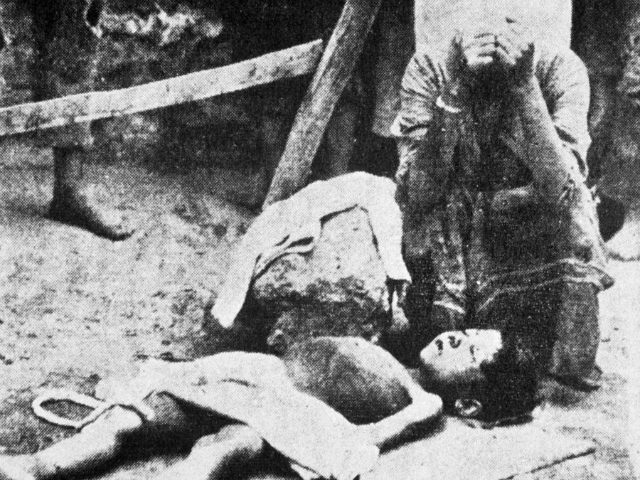People around the world paused to commemorate Armenian Genocide Remembrance Day on Tuesday, a remembrance of the more than 1.5 million Armenians who were systematically exterminated between 1915 and 1923 under the Ottoman Empire.
Thousands of people marched in Los Angeles, home to one of America’s largest Armenian communities, to demand recognition of the genocide. Yet in his commemorative statement, Trump only went as far as describing the events as a “mass atrocity”:
Today we commemorate the Meds Yeghern, one of the worst mass atrocities of the 20th century, when one and a half million Armenians were deported, massacred, or marched to their deaths in the final years of the Ottoman Empire. We recall the horrific events of 1915 and grieve for the lives lost and the many who suffered.
By international law, genocide is defined as an “intent to destroy, in whole or in part, a national, ethnical, racial or religious group.” Although Trump’s statement recognizes the tragedy that took place, it missed an important detail, widely recognized by scholars, historians, and other experts — that what took place was not indiscriminate massacres, but a planned act of genocide.
This refusal to describe the events as a genocide is based on the U.S’s fear of upsetting the Turkish government, which vehemently denies allegations of genocide. Yet the U.S. is not alone. As of 2018, just 29 countries worldwide have officially recognized what happened in those years as a “genocide.”
Their stance is in stark contrast to a country like Germany, which has made the utmost efforts to heal the wounds of the Holocaust through commemorations and reparations. Meanwhile, Turkey continues to deny many of its crimes and even persecutes those who demand its recognition.
When former President Barack Obama came to power in 2009, he promised the more than one million Armenians living in the United States that he would recognize the genocide, although, like many of his foreign policy promises, it never materialized.
Yet recognition of the genocide remains an important conservative issue. The Armenian genocide was the first Christian genocide of the twentieth century and led to the displacement of millions of people from their Biblical homelands.
To this day, Turkey controls vast swaths of Armenian territory, while many of its Armenian inhabitants have been forced to convert to Islam. Christians are systematically persecuted, particularly those living in Kurdish territories. One recent example is the continued detention of American evangelical pastor Andrew Brunson on what appear to be phony terror-related charges.
Trump has styled himself as a defender of persecuted Christians around the world, and recognition of the genocide would go a long way to reinforcing his image as a protector of Christians in the Middle East.
A failure to recognize the past also serves as a partial endorsement of Turkey’s denial, under an Islamist regime whose leader Recep Erdogan has shown increasing aggression towards America with the threat of an “Ottoman slap” against U.S. troops in Syria.
Danny Tarkanian, an Armenian American endorsed by Trump in his race in Nevada’s 3rd Congressional District, has urged Trump to “set an example for the rest of world by formally acknowledging what truly happened.”
“If we are to prevent the worst of human tragedies from occurring, the world must recognize genocide and call it what it is,” Tarkanian told Breitbart News. “Adolf Hitler used the Armenian Genocide as a justified precedent for his atrocities against millions when he said, ‘Who, after all, speaks today of the annihilation of the Armenians?'”
Clearly defining past genocides is important to holding modern genocidal actors accountable. In 2016, former Secretary of State John Kerry rightly acknowledged that the Islamic State had committed acts of genocide against Assyrian Christians and Yazidis in Iraq and Syria. Yet why couldn’t the same recognition be given to Armenians?
Since coming to office last year, Trump has demonstrated considerable boldness with foreign policy issues ranging from North Korea to officially acknowledging Jerusalem as the capital of Israel. Now, it is time for his administration to show further strength by acknowledging the tragic history of one of America’s most loyal immigrant communities.
Follow Ben Kew on Facebook, Twitter at @ben_kew, or email him at bkew@breitbart.com.

COMMENTS
Please let us know if you're having issues with commenting.